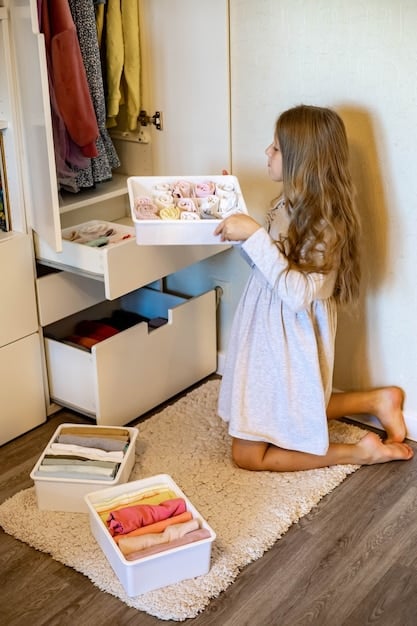Embrace The Zen of Simplicity: Finding Fulfillment in Less

The Zen of Simplicity advocates for intentional living by decluttering physical and mental possessions, leading to increased focus, reduced stress, and a deeper appreciation for the present moment, ultimately revealing that true fulfillment lies not in accumulating more, but in cherishing what truly matters.
In a world obsessed with materialism, the Zen of Simplicity: How to Live a More Fulfilling Life with Less Material Possessions offers a refreshing and transformative path towards inner peace and lasting happiness. Are you ready to unlock a more meaningful existence?
Understanding the Core Principles of Zen Simplicity
Zen simplicity isn’t just about getting rid of things; it’s a profound philosophy that touches every aspect of our lives. It encourages us to intentionally minimize distractions and appreciate the present moment, fostering a greater sense of mindfulness and contentment.
At its heart, Zen simplicity invites us to question our relationship with material possessions and societal expectations. It’s about consciously choosing to live with less, making room for what truly matters – our relationships, experiences, and inner growth.
The Essence of Minimalism
Minimalism is a key component of the Zen of Simplicity, focusing on decluttering our physical spaces to create a more peaceful environment. This involves consciously curating our belongings and only keeping items that serve a purpose or bring joy.
Mindfulness in Consumption
Another core principle is being mindful of our consumption habits. Before making a purchase, ask yourself: Do I really need this? Will it truly enhance my life? This conscious approach to consumption can lead to a more sustainable and fulfilling lifestyle.
- Intentional living: Making conscious choices about what we bring into our lives.
- Reducing clutter: Letting go of unnecessary possessions to free up physical and mental space.
- Appreciating experiences: Prioritizing experiences over material goods for long-lasting happiness.
- Finding joy in simplicity: Discovering contentment in the beauty of everyday moments.
Ultimately, the Zen of Simplicity is about creating a life that aligns with our values and brings us closer to our true selves. It’s a journey of self-discovery and liberation from the burdens of materialism.

Benefits of Embracing a Simpler Lifestyle
Choosing a simpler lifestyle offers numerous benefits that extend far beyond just physical decluttering. It positively impacts our mental well-being, financial stability, and overall quality of life.
By letting go of unnecessary possessions and shifting our focus to what truly matters, we open the door to a more fulfilling and meaningful existence. It’s about intentionally designing a life that supports our values and nourishes our soul.
Reduced Stress and Anxiety
One of the most significant benefits of simplifying is the reduction of stress and anxiety. A cluttered environment can contribute to feelings of overwhelm, while a minimalist space promotes calmness and clarity.
Increased Financial Freedom
Living with less also translates to increased financial freedom. By curbing impulsive spending and focusing on essential purchases, we can save money and invest in experiences and opportunities that truly enrich our lives.
- Improved mental clarity: A decluttered mind leads to better focus and decision-making.
- More time for passions: Eliminating time wasted on managing possessions frees up time for pursuing hobbies and interests.
- Deeper connections: Focusing on relationships rather than material goods enhances our bonds with loved ones.
- Greater sense of gratitude: Appreciating what we have fosters a sense of contentment and satisfaction.
Embracing a simpler lifestyle is an investment in our well-being and overall happiness. It’s about creating a life that is aligned with our values and brings us closer to our authentic selves.
Decluttering Your Physical Space: A Practical Guide
Decluttering your physical space is a fundamental step towards embracing the Zen of Simplicity. It involves consciously evaluating your belongings and letting go of items that no longer serve a purpose or bring you joy.
This process can seem daunting, but with a strategic approach and a clear understanding of your goals, you can transform your living space into a sanctuary of peace and tranquility.
Start Small and Set Realistic Goals
Begin by decluttering one area at a time, such as a drawer, a shelf, or a corner of a room. Setting achievable goals will prevent you from feeling overwhelmed and help you maintain momentum.
The “Marie Kondo” Method
Consider using the Marie Kondo method, which involves holding each item and asking yourself: “Does this spark joy?” If the answer is no, it’s time to let it go. This approach helps you connect with your belongings on a deeper level and make more mindful decisions.

- Category-based decluttering: Focus on one category of items at a time, such as clothes, books, or kitchenware.
- The 20/20 rule: If you can replace an item for less than $20 in under 20 minutes, it’s safe to let it go.
- Donate or sell: Give your unwanted items a new home by donating them to charity or selling them online.
- Create a “maybe” box: If you’re unsure about letting go of an item, put it in a box and revisit it in a few months. If you haven’t missed it, donate it.
Decluttering your physical space is not just about getting rid of stuff; it’s about creating a more intentional and mindful living environment. It’s a process that can bring greater clarity, peace, and joy to your life.
Cultivating a Minimalist Mindset
While decluttering your physical space is essential, cultivating a minimalist mindset is equally important for achieving lasting simplicity. This involves shifting your focus from external possessions to internal values and experiences.
A minimalist mindset encourages us to be more intentional with our thoughts, actions, and relationships, creating a more fulfilling and meaningful life. It’s about consciously choosing what we allow into our minds and hearts.
Practice Gratitude
Gratitude is a powerful tool for cultivating contentment. Take time each day to appreciate the simple things in your life, such as a warm cup of coffee, a beautiful sunset, or a loving relationship.
Limit Exposure to Advertising
Advertising often fuels our desire for more possessions. By limiting your exposure to ads, you can reduce the temptation to consume and focus on what you already have.
- Practice mindfulness: Be present in the moment and appreciate the beauty of everyday experiences.
- Challenge negative thoughts: Replace negative self-talk with positive affirmations and self-compassion.
- Set boundaries: Protect your time and energy by saying no to commitments that drain you.
- Focus on experiences: Prioritize experiences over material goods for long-lasting happiness.
Cultivating a minimalist mindset is an ongoing process that requires conscious effort and commitment. However, the rewards are well worth the effort, leading to greater peace, joy, and fulfillment in your life.
Zen Simplicity in Relationships
The principles of Zen simplicity can also be applied to our relationships, fostering deeper connections and more meaningful interactions. This involves letting go of expectations, practicing active listening, and focusing on genuine connection.
By simplifying our relationships, we can create more space for love, compassion, and understanding, enriching our lives and the lives of those around us. It’s about intentionally nurturing the bonds that matter most.
Practice Active Listening
When engaging in conversations, practice active listening by fully focusing on the speaker without interrupting or judging. This shows respect and fosters deeper understanding.
Let Go of Expectations
Unrealistic expectations can strain relationships. By letting go of expectations and accepting others for who they are, we create more room for compassion and acceptance.
- Be present: Give your full attention to the person you are with, without distractions.
- Express gratitude: Show appreciation for the people in your life and the role they play.
- Forgive others: Let go of grudges and resentments to create more space for love and understanding.
- Communicate openly: Share your thoughts and feelings honestly and respectfully.
Applying the principles of Zen simplicity to our relationships can lead to more fulfilling and meaningful connections. It’s about prioritizing genuine interaction and creating a supportive and loving environment.
Overcoming Challenges on the Path to Simplicity
Embarking on the path to simplicity is not always easy. We often face challenges such as societal pressures, emotional attachments to possessions, and the fear of missing out.
However, by acknowledging these challenges and developing strategies to overcome them, we can stay committed to our goals and continue to progress on our journey towards a simpler and more fulfilling life. It’s about resilience and unwavering determination.
Societal Pressures
We live in a society that often equates success with material possessions. It’s important to remember that true happiness comes from within and is not dependent on external validation.
Emotional Attachments
We often form emotional attachments to our possessions, making it difficult to let go. Acknowledge these attachments and remind yourself that your value is not defined by what you own.
- Focus on progress: Celebrate your successes, no matter how small, and learn from your setbacks.
- Seek support: Connect with like-minded individuals who can offer encouragement and inspiration.
- Be patient: The journey to simplicity is a marathon, not a sprint. Be kind to yourself and celebrate every step of the way.
- Remember your why: Keep your initial motivation in mind to stay focused and committed to your goals.
Overcoming challenges on the path to simplicity requires patience, self-compassion, and a strong commitment to your values. By staying focused on your goals and seeking support when needed, you can create a life that is aligned with your true self.
| Key Point | Brief Description |
|---|---|
| 🧘 Mindfulness | Being present, appreciating the now. |
| ✨ Decluttering | Removing unnecessary possessions and distractions. |
| 🌱 Intentional Living | Making conscious choices that align with values. |
| ❤️ Relationships | Fostering deep, meaningful human connections. |
Frequently Asked Questions
▼
Zen Simplicity is a philosophy that encourages intentional living by minimizing possessions and distractions, allowing for a deeper appreciation of the present and what truly matters.
▼
Decluttering reduces stress and anxiety by creating a more peaceful environment, freeing up time, and allowing you to focus on experiences and relationships rather than material things.
▼
Start by decluttering one area at a time, practice mindful consumption before making purchases, and limit your exposure to advertising that fuels the desire for more possessions.
▼
Practice active listening, let go of expectations, be present with loved ones, express gratitude, and communicate openly and honestly to foster deeper connections and understanding.
▼
Common challenges include societal pressures, emotional attachments to possessions, the fear of missing out, and the need for constant validation. Acknowledge these challenges and seek support when needed.
Conclusion
Embracing the Zen of Simplicity is a journey of self-discovery and liberation. By intentionally decluttering our physical spaces, cultivating a minimalist mindset, and nurturing meaningful relationships, we can unlock a more fulfilling and authentic existence, discovering that true happiness lies not in having more, but in appreciating what truly matters.





